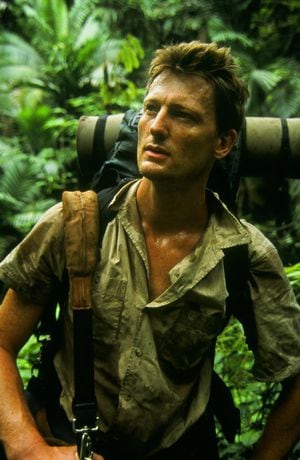Benedict Allen talks ahead of Shrewsbury and Birmingham shows
Benedict Allen is one of the world’s most renowned adventurer-explorers. He’s recorded six series for the BBC and gained access to some of the most isolated communities in the world while completing a number of remarkable journeys.

Last year Benedict was on a solo expedition to Papua New Guinea, filming his journey to visit a community he had befriended 30 years ago. He hit the headlines when he failed to turn up to Port Moresby for a scheduled flight to Hong Kong, prompting his friends and family, and eventually the world media, to become concerned for his wellbeing.
Travelling with no mobile phone for contact or GPS, Benedict was eventually located and brought back from the tribal warzone by helicopter, whereupon it was discovered that he’d been battling malaria and dengue fever. Benedict plans to show extracts from this astonishing expedition in this brand-new talk, and will be releasing the full film later this year.
And he will also share details when he visits local theatres later this year, with talks at Shrewsbury’s Theatre Severn on October 29 and Birmingham Town Hall on November 27.
He says: “This is a hugely exciting venture for me: I can’t wait to travel the UK and, share my experiences of some of the most testing, but also wonderfully inspiring, corners of the globe.”
In this new show, Benedict – famous for ingratiating himself with indigenous communities during his journeys – will tell the whole unvarnished truth of his most recent adventure, recalling the highs and lows of this awe-inspiring trip as well as his life as an explorer using his trademark good humour. Benedict will talk of his earliest influences, including his father flying a Vulcan bomber as a test pilot, comparing this to his own experiences and discussing the role of the explorer in the 21st Century.
Often cited as the last of the classical explorers, Benedict is the only person known to have crossed the Amazon Basin at its widest. He believes passionately that we all have an inner adventurer and that the Golden Age of exploration lies not behind us, but ahead. In his latest and most revealing show, Benedict encourages people of all ages to look for adventure near and far from home. He talks passionately about the nature of risk taking – both in our lives and in our own minds, urging us all to take up the most impossible-seeming challenges in our lives.
He has been described as being the last of the classical explorers.
He says: “In my twenties and thirties, I was fortunate to get the chance to embark on difficult journeys for which I had a good reason for going. Back then there were still large sections of the world we didn’t know; whole valleys and mountainous areas that even local people hadn’t recorded.
“I also think people often think of me as a classic explorer type because I do it in an old-fashioned way. Off I go without GPS navigation or satellite phone. Actually, to me, this is all part of my rejection of that traditional type of explorer. I didn’t want to be planting flags, or imposing my point of view. I just wanted to go very quietly into people’s communities and listen to them. That meant going alone and spending a long time in remote communities. I wanted to see them as places that weren’t alien, and to strip away that idea of its being an exotic place; trying to get to a state where I’d see it as the locals did – like a home rather than a threat.”
Despite visiting many sparsely populated areas, Benedict still hankers to visit a number of corners of the world.
“Yes, there are pockets. There are mountain ranges in the Andes, gulleys in China, waterfalls in South America still hidden by rainforest. There’s Antarctica. And of course there’s the ocean bed. There are even a few tribes on the Peru-Brazil border that haven’t been contacted by the outside world. We’ve observed them from aircraft and they’re aware of us.”
Recently, he visited the Peruvian Amazon, visiting the Matses people. Despite his experiences last November, he decided to travel without GPS navigation and satellite phone.
“Yes. My fellow adventurers and explorers don’t necessarily share my point of view and many of them take a lot of gadgets with them. But they’re doing different things perhaps. For me it’s all about learning from local people.
I will take a camera, however. Although I’m a low-tech person who tries to immerse myself into a community, part of the job of an explorer is to record. So I’ll be writing and filming as I go along. I’ll also take a survival kit.”
Travelling is tough because Benedict has three children and he is away from them for long periods of time.
“It’s always hard for the ones left behind. I have three children, aged 10, eight and two. I find it very hard leaving them. But it also fires me up. I feel I’m partly doing it for them. Part of being an adventurer is that you’re not too sensible.”





